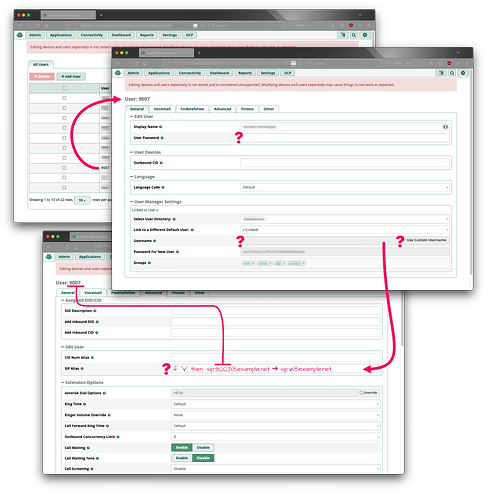Loosely, from the picture up, it’s more what I know and have done (experience-wise. and actions in this specific case). From the picture down are the questions.
I’d like to setup FreePBX to be used for SIP URI-based calling only. Yeah-yeah, I know technically all calls use the sip: schema, what I mean is no interconnection with POTS whatsover but something purely digital configurable anywhere where there’s a softphone or a user-friendly deskphone, so… just softphone. Sort of like Jabber/XMPP back in the day.
In my hardware PBX, which I think doesn’t even have the SIP standard fully implemented, I’ve been able to make it work in a pseudo-domain using DNS. Phones can find it using NAPTR records, for instance, both to place calls and to help configure themselves, and it basically works as if it were domain-aware but it’s not, it couldn’t care less it seems, it’s more like “I guess [reverse] DNS matches my IP address, oh well, whatever”.
For a few months I’ve had this new FreePBX installation idling where I’d set that up in it, but I’m not sure how. When I set it up I interconnected it with my hardware PBX, and made calls across systems and all but these were done with extension numbers, though once again it was easy to make it discoverable through DNS. My hardware PBX connects to POTS lines which goes against my goal so I undid the link, and I knew it would take me a while to set up FreePBX, including securing it. There’s nothing that could generate cost* but still.
Now that I have a little more free time, I’m setting it up a bit randomly. So far I joined it to Active Directory, made AD the default directory and made it so users are managed in AD at least until I’m acquainted enough to let it write to AD, set up numbers for the users in AD and verified they appear in FreePBX; all good. Then it was time for extensions, it (re-)learned AD users can’t use their existing passwords to set up extensions.
What’s the point of using a directory service then!? Keeping a single set of credentials per user is their number one foutue raison d’être !…
It went on for a while.
After cooling off, I continued exploring. I think, FreePBX considers a random set of numbers more memorable than a user-chosen i.e. a meaningful word, thus it chose it for the username. Silly machine.
I forgot about that since the other other last time I tried this, but anyway, whatever. I shrug it off and moved on only to find a plethora (but more like 2-3) of username fields, which kinda contradict each other.
What do each do?
In the Advanced tab of a user, there’s the SIP alias box, I remember this was what it was used to give an extension a proper username, but that too contradicts the other username fields. Is this still used?
And, I don’t know where is it, but usually in the trunks area there’s something that says something along the lines of “domain” or “from domain”. It’s also available on my hardware PBX. Is that related at all? On every single platform I’ve seen it it’s very ambiguous of meaning. When I used to use SIP trunks, some of them required this too and it would be nothing related to my domain, or even to the providers’, but rather to the operator the provided resold service from, I think. That only raised more questions.
Could you guide me a little on how to make the system domain-aware, please? Just big picture, I’m happy to do my own homework.
Even if you can’t help, thanks anyway for your time. ![]() <3
<3
*
Phone lines are included with ISP’s service, 900s have to be manually allowed, etc
